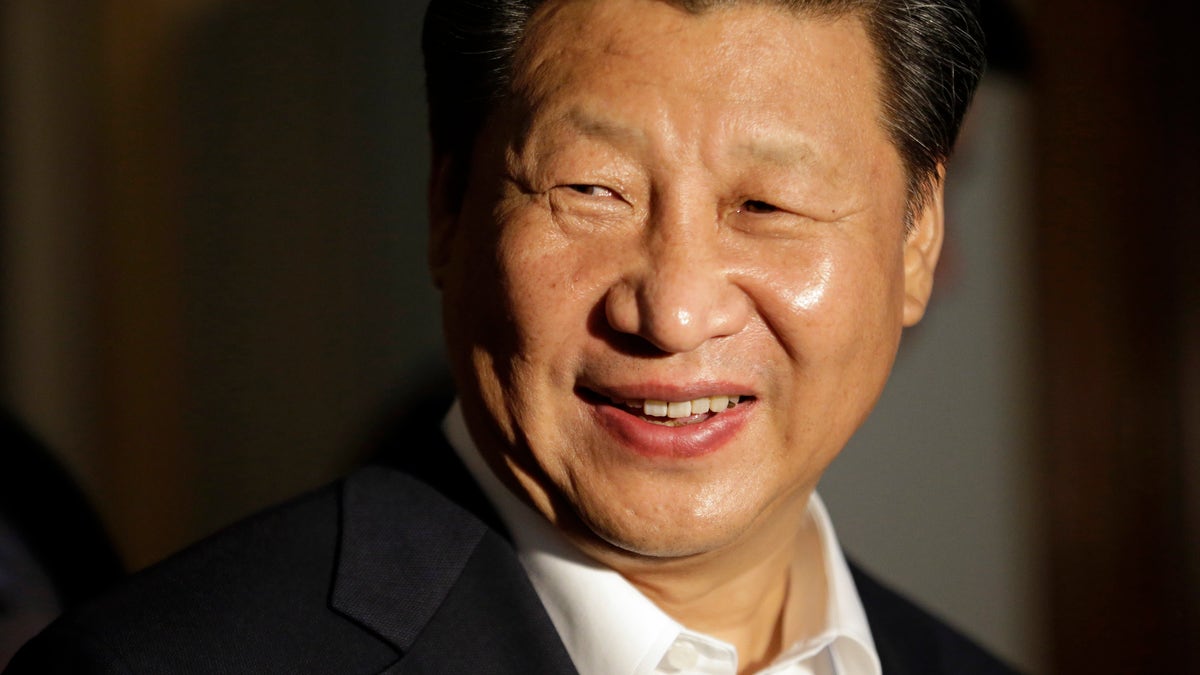
Chinese President Xi Jinping smiles as he concludes a visit to Lincoln High School, Wednesday, Sept. 23, 2015, in Tacoma, Wash. Xi is on the second of a three-day trip to Seattle before traveling to Washington, D.C., for a White House state dinner on Friday. (AP Photo/Elaine Thompson)
As President Xi Jinping is honored by President Obama at the White House, U.S. policy toward China is at a crossroads. President Obama’s attempts to engage China to resolve common challenges have failed. The result has been a more nationalist and belligerent rising power that threatens to undermine stability in Asia and destabilize the international economy.
The Obama administration’s response to China’s behavior has been high on rhetoric and low on action. After announcing a pivot towards Asia, President Obama devoted insufficient resources to the effort, fueling questions about America’s resolve. The White House has barred the Navy from freedom of navigation exercises near China’s claimed islands in the South China Sea. And after repeatedly leaking threats to respond to Chinese cyber attacks through sanctions or other measures, the Obama administration has failed to follow through.
President Obama may believe that his reluctance to act is prudent. In fact, it is the opposite—dangerously breeding misunderstanding and encouraging China to test the limits of acceptable behavior.
President Xi’s visit represents President Obama’s perhaps final opportunity to reverse course. He should encourage China’s emergence as a peaceful and prosperous nation. But he must be forceful and direct about U.S. concerns. If he fails to do this, as President, I will ensure that U.S. policy toward China better reflects the full range of concerns we have with Beijing's actions..
This would begin with highlighting China’s repression of ethnic minorities, religious believers, and dissidents and human rights defenders who desire nothing more than the realization of their most basic human rights. This is true of course for the people of Hong Kong who have seen Beijing attempt to subvert their autonomy and thwart their democratic aspirations. This worsening crackdown on the rights of the Chinese people is not only immoral but threatens the long-term vitality of Chinese society. Without free people and the free exchange of ideas, China cannot have truly free markets and a healthy economy.
The U.S-China economic relationship has benefited both our countries. Millions of Chinese have been lifted out of poverty, creating a potentially vast market of middle class consumers. But in recent years, Beijing’s policies have increasingly threatened our economic security.
Experts have long recognized China’s need to shift away from state-led investment and exports to an open, consumer-driven market economy. Yet China has made little progress, and Beijing’s response to the recent stock market crash and its intervention in international currency markets suggest more of the same. I would encourage continued reforms and warn China's leaders that tightening restrictions are also making it more difficult for U.S. companies to do business in China.
We must also confront Beijing regarding Chinese cyber attacks. Chinese hackers have penetrated government and private sector networks on a massive scale, stealing billions in intellectual property as well as the medical and personnel records of millions of Americans.
The United States has repeatedly warned China to stop but refrained from any meaningful response. It should be made clear that the hacking has reached a point that the United States has no choice but to respond with targeted sanctions and, if necessary, offensive cyber operations.
China has matched its cyber aggression with brazen and illegal land-grabs in the South China Sea. Its island building and increased military presence challenges freedom of the seas. On several occasions, Chinese ships and aircraft have nearly collided with U.S. planes and ships.
I would emphasize that our history as a seafaring nation, and the world’s dependence on shipping through the South China Sea, make freedom of navigation a core U.S. interest. Under my leadership, our military will not be deterred from operating throughout international waters and airspace.
China’s expansion in the South China Sea is part of a broader, long-term military buildup. For the past two decades, China has increased its military spending at double digit-rates. The scale and secrecy of this campaign raises serious concerns.
Many of China’s new weapons clearly target the capabilities of its neighbors and of the United States. I would make clear that these actions are wasteful, dangerous and will ultimately prove self-defeating. We and our allies will do what is necessary to defend our interests and preserve stability.
If Beijing wants to play a greater role on the world stage, then I would insist on more responsible leadership—particularly when it comes to nuclear proliferation.
In the past twenty years, two of China’s closest allies, North Korea and Pakistan, have become nuclear powers—proliferation for which China bears much responsibility. Beijing has been reluctant to use its leverage to persuade Pyongyang to curb its nuclear ambitions. It must begin to take a leading role in nonproliferation efforts, starting with North Korea.
The U.S.-China relationship holds enormous potential. But that potential will never be realized while President Xi insists on pursuing policies that increasingly threaten U.S. national security and prevent China’s citizens from fulfilling their potential.
President Obama seems to not understand this. As president, I will restore American strength and moral clarity in our relationship with China and convey American resolve on the issues facing the United States and China.
Frank talk and the willingness to back it up are the only ways to ensure a better future for both our countries.








































